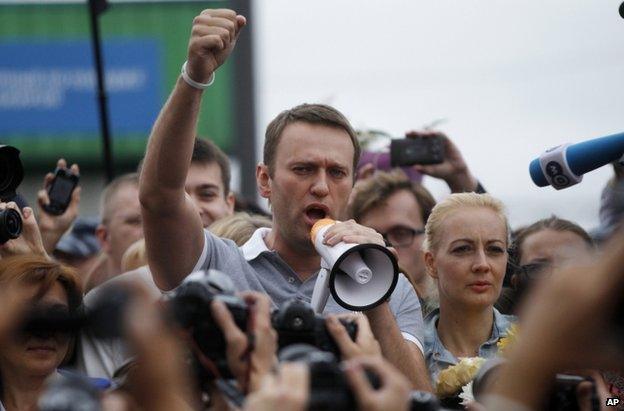Russian opposition leader Alexei Navalny wins European human rights payout
- Published

Alexei Navalny has quickly built up a reputation for being Vladimir Putin's most vociferous critic
The European Court of Human Rights has ordered Russia to pay more than 63,000 euros (£54,000) in compensation to opposition politician Alexei Navalny.
The ECHR said his right to peaceful protest had been violated multiple times during a series of political gatherings dating back to 2012.
Mr Navalny welcomed the decision as "excellent", saying Russia's "lying, corrupt and hypocritical justice system" had "got a kicking".
Russia has three months to appeal.
The ruling also said the activist had been denied his right to a fair hearing.
Mr Navalny is now Vladimir Putin's most prominent and vocal critic. Well-known for his anti-corruption campaigning, he has recently stepped-up his political activity after announcing plans to run for president next year.
Alexei Navalny: 'Putin is the tsar of corruption'
But he reacted to the Strasbourg ruling from another Russian courtroom.
The activist is currently being re-tried in Kirov for embezzlement from a state-run timber company, Kirovles. He received a five-year suspended sentence after an earlier trial in 2013, but the verdict was later quashed by Russia's Supreme Court. It sent the case sent for retrial after the ECHR ruled the original verdict unsound.
Mr Navalny argues that the Kirovles case is fabricated in order to keep him out of politics. He has described the rerun of the trial as an "exact copy" of the original proceedings, and says he is sure he will be found guilty once again. A criminal conviction would bar him from running for president.
The activist planned to open an election HQ in Russia's second city of St Petersburg this weekend. However, the judge hearing the Kirovles case has now banned him from leaving town until 10 February.
In November Mr Navalny received a payout from the justice ministry worth about 53,000 euros in compliance with the ECHR ruling on the previous Kirovles trial.
He published a bank statement to show the money had appeared in his account. He joked that he got the compensation the day after he had said he would not go to Kirov for the new trial because he had not got enough money to cover expenses.